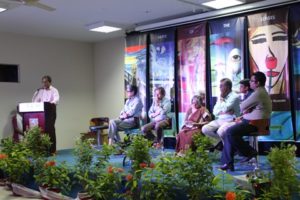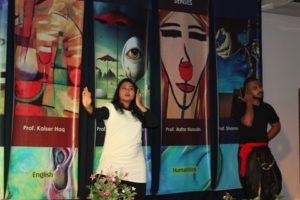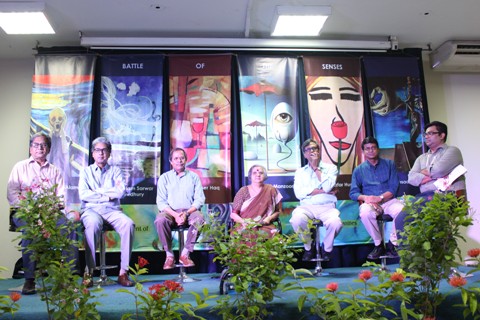Battle of the Senses
On 4 August 2017, to make sense of human senses in literature, the Department of English and Humanities of ULAB arranged a sensory debate named “Battle of the Senses”. Six well-renowned professors of the English department, Prof. Fakrul Alam, Prof. Golam Sarwar Chowdhury, Prof. Kaiser Haq, Prof. Azfar Hussain, Prof. Syed Manzoorul Islam and Prof. Shamsad Mortuza were the soldiers of this so-called battle. Each of them championed one particular “sense” with Ms. Khushi Kabir as the judge.
The battle is, perhaps, a misnomer as the participants agreed that there could not be any “battle” of the senses as each sensory organ needs the other. Prof. Dr. Fakrul Alam elaborated the sense of “Sound” as used in literature. He meticulously presented how the very presence of sound helps us in terms of making sense of our own lives and how even the very absence of sound can give us eerie insights about the Universe in general or make life as we know it painfully empty. He gave the audience a sound concept of the sense of “sound” and his profound utterances made the audience reevaluate the effects and importance of sound in their lives.
Prof. Dr. Golam Sarwar Chowdhury explained the mysterious “Sixth sense”- a sense beyond the senses to some and “nonsense” to the rest. In his argument, Prof. Golam Sarwar Choedhury gave the audience some sense about “other” senses indefinable when compared to the conventional five senses. He introduced the audience with proprioception, the ability to sense heat and cold, nociception- the ability to feel pain, equilibrioception, the sense of balance that helps us to keep our balance and sense body movement, chronoception- the ability to sense the passage of time, and kinesthesia, the sense of movement. By demonstrating all these types of senses, he tried to prove that humans have more senses than the established five senses and that all these senses together create the sagacious sixth sense. Prof. Sarwar shared some uncanny stories to leave the audience awe-struck, and make them ponder over what may lie beyond the horizon of our five perceptible senses.

Then it was Prof. Dr. Kaiser Haq’s turn to present his sense of “Taste”. In a playful manner, he reminded the audience that in the event, only the senses will battle with each other and not the professors. He reinforced how senses are correlated and therefore, always work in harmony. He explained how different disciplines of aesthetics engender from the sense of taste. In his well-organized argument, he claimed that the sense of taste is “the sense of senses” as every other sense is cultivated based on the “taste” of a person. With some brilliant reasonings, he concluded his speech by warmly suggesting the audience to cultivate their “taste” from which will ensue the natural metamorphosis of other senses.
The next speaker was Prof. Dr. Azfar Hussain who highlighted the sense of smell. His prose poem on smell, written in response to two poems by Pablo Neruda and William Carlos Williams invigorated everyone’s “nose” for a good story. He established the concept of smell using different aspects of life and philosophy. He also brought up different real-life signs explaining how smell is related to the tiniest yet most precious details of our lives. He argued that the sense of taste is rather “parasitical” in its nature in stark contrast with the sense of smell. According to him, it is nothing but the olfactory perception above all that makes our lives brisk and lively and that without the implications of smell, life would be dull and tasteless. Prof. Hussain then ended his argument with a call to the audience to reactivate and celebrate the sense of smell to make sense of love, liberation, and life itself.
After the “smelly” discourse, Prof. Syed Manzoorul Islam took the central stage to argue for the sense of “Sight.” He explained how visual sight is not only limited to the external ability to see things but also involved with the ability to see internal things like our mind or the mood swings we experience. He pointed out that in the present times of spectacles, different forms of “gazing” and numerous images created based on pluralistic visions are creating a “hyperreal” society. He also explained the basic differences between the male gaze and the female gaze, how a single gaze can change the state of something. He ended his arguments elaborating the significance of the mind over the physical eye and advised the audience to open their mind’s eye.

The last but not the least was the sense of “Touch” meticulously presented by Prof. Shamsad Mortuza. He presented “Touch” as a precious sense which is connected to every little memory of our lives. He demonstrated how heartfelt touches can create mutual understanding and how a coarse one can even destroy an entire civilization for that matter. He introduced the audience with different kinds of touch and how each of them can make a difference in our lives. He argued that touch or skin covers every other sense whether it is the smelling nose, hearing ears, seeing eyes or the tasting tongue. Even the sixth sense needs to be touched by something to sense something. His intellectual and insightful argument touched the audience deeply and made them see all possible everyday touches from a different perspective.
This battle of senses was fought by six extraordinarily intelligent and intellectual professors where each of them significantly contributed to the confusions and took the battle between senses to a greater extent. Their witty arguments left the audience bewitched and bewildered. But each of them successfully delivered one common truth which is that no individual sense makes sense on its own till it is understood in association with the rest. After this vigorous battle between senses fought by six startling male professors was finished, the chief guest and the one and only female of the program, Ms. Khushi Kabir took the podium. After commenting on each professor’s arguments she stated that though in every battle there is a winner and a loser, one only loses when one gives up. She wrapped up by saying, one can never lose as long as he/she refuses to give up. Therefore, the battle continues …
Covered by- Tanzila Mobarak Joty, DEH

